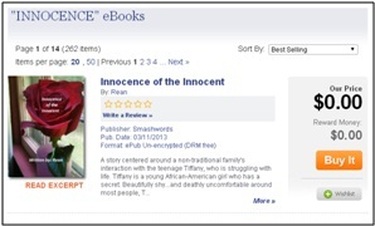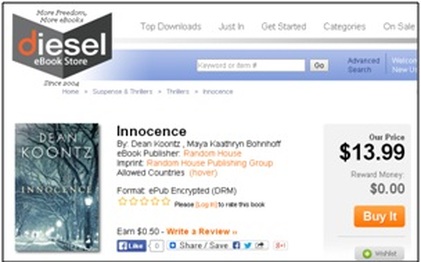He said, “The internet is disrupting every media industry. The future is happening to book selling. Amazon is not happening to book selling.” Responding specifically to the complaints about Amazon, Bezos said: “Complaining is not a strategy.”
I was reminded of this today when I made a casual review of several eBookseller sites, which sell a wide selection of eBooks for buyers around the world. One can very well say that when it comes to sale of eBooks, they are indeed competitors to Amazon.
Why are eBook sellers losing money from potential customers?
I did a very basic comparison of these sites to the Kindle eBooks section of Amazon.com. It was shocking to see these sites leave money on the table because they haven’t got their search function right.
Why are they doing it? If they don’t take care of their own interests, can these sites then complain against Amazon for its competitive instincts?
I adopted a simple methodology. I opened The New York Times fiction bestseller list for eBooks from a couple of weeks ago. I had already downloaded this sometime ago for a comparative study. I went there again and randomly picked up a few bestsellers.
First stop, Diesel eBooks (diesel-ebooks.com). I searched for the eBook Innocence (by Dean Koontz), a current NYT bestseller. This is what I got:
I made the same search in the Amazon Kindle eBookstore to get the following result:
I went back to Diesel, and this time searched for the full title plus the author name. It turns out that the eBook is actually available in Diesel eBookstore, and that too at least for Indian buyers, at a much discounted price to that of Amazon:
Twenty-fifth result! Just imagine. No why would any eBookseller offer a full page of adult eBook fiction as the search results page for Innocence, and return a free eBook as the top result? Shouldn’t its internal search default to relevance like Amazon’s does, and give weightage to an eBook listed as a bestseller by the prestigious NYT ? Scott Redford of Diesel, are you listening?
Why is eBooks.com ignoring Linda Lael Miller?
Next stop, eBooks.com. I searched for Linda Lael Miller. Her work Big Sky Secrets is currently an NYT bestseller.
But you wouldn’t know if you searched for her name in eBooks.com:
Shouldn’t the search algorithm of the site be changed to give some weightage to the NYT bestseller list? Stephen Cole of eBooks.com, are you listening?
Why can’t eBookmall.com not search for full title and author?
See what happened when I searched for the full title and author name at ebookmall.com:
So Amazon is not perfect, but still it takes you where you want to go.
I returned to ebookmall.com and performed one more search. This time, just for the eBook title. It turns out the eBook was actually available there:
Infibeam too has to improve
What about India? Infibeam (infibeam.com), co-founded by former Amazon employee Vishal Mehta, offers a good selection of eBooks. But here too, I found that they could improve upon their search function a bit more.
Look what I got when I searched for Laura Lael Miller in Infibeam:










 RSS Feed
RSS Feed
